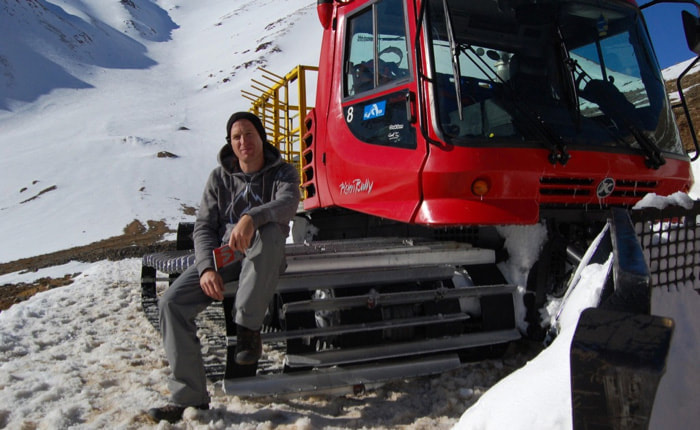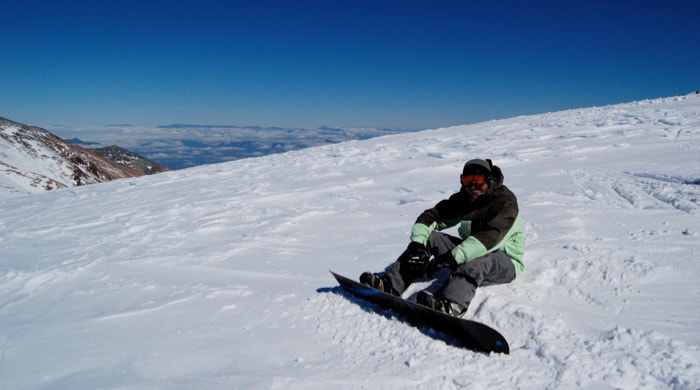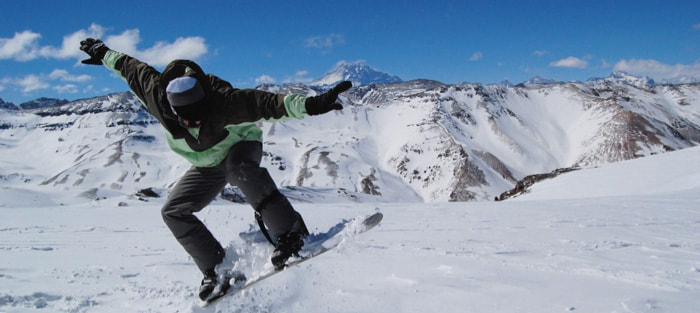|
Three hours drive from the Chilean capital of Santiago is a ski resort without any shops, malls, or promenades. There are no restaurants, bars or hotels either. There’s not even a ski lift. Yet it still attracts clients from around the world, and for good reason. Ski Arpa is the dream of a lifelong ski instructor who scrapped and saved over three decades to open a mountain for anyone in love with stunning views, and untracked snow. Here, two Pisten Bully Snowcats shepherd up to 22 skiers to the top of the mountain, where they have mind-boggling access to 4000 acres of skiable terrain. Toni Sponar, a veteran ski-instructor of Aspen, Banff, and number of South American ski resorts, bought 5000 acres of land back in 1983. At just $5000, it was a bargain even for a ski instructor. The location was ideal. From atop the peak of Alto del Arpa you can see the Pacific Ocean to the west, and Mount Aconagua, the tallest mountain outside the Himalayas, to the east. The south facing slopes receive plenty of sun, protected from harsh winds, with chutes forming in natural abundance. Surrounding you is the Andes mountain range in all its glory - so different from the view in the Rockies, or the Alps. A year after his dream purchase, Toni installed a ski lift and set to work creating an 8km switchback road to the base lodge. Then disaster struck. A massive storm dumped metres of snow, causing an avalanche that wiped out the lift, the lodge, and all of Toni’s savings in the process. He would still visit his mountain with friends over the years, but it would take another 20 years before he could resurrect his dream of a skier’s ski resort. He purchased two Snowcats, aligned with booking and marketing agents, and finally created the most rewarding catskiing operation on the continent. Clients visit from around the world for the powder, the sweeping vista, and the unlimited fresh tracks. As we slowly make our way up the switchbacks, the van abruptly stops and one of my fellow passengers throws up. It’s a rough road, which Toni maintains himself, zig-zagging 600m up the valley. I’m feeling a little queasy from the altitude, but the excitement seems to settle my stomach. I only discovered the joy of snow when I moved to Canada in my twenties. When I was 6 years old, a once-a-century freak snowstorm hit Johannesburg. My schoolteacher, having never seen snow, made the class hide under our desks. She thought it was nuclear fall out. I was retelling the story in the van as the switchbacks became ever steeper. Finally, our Swiss driver announces we have arrived. Next to the parking clearing is a humble, rustic building, built deliberately into the hill to avoid being wiped out by an avalanche like its predecessor. I am blessed with perfect conditions – the sky is clear and blue, and a 20cm of snow fell overnight. I sign a waiver, and get handed an avalanche transmitter by Anton, Toni’s son and partner in the operation. There are a dozen clients today, made up of Americans from Colorado, some French, some German. This is not Whistler or St Moritz or Aspen. We have all packed our own lunch, and accept the simplicity of the amenities. We have come for the snow, not the glitz. It takes 45 minutes for the powerful snowcat to make its way up the mountain. I am standing at the back of the outdoor passenger area, watching Toni and another skier being towed behind us. The snowcat eats the steepest of inclines, charging like a tank up towards the peak. The air gets thinner and colder, and suddenly, the full might of the Andes appear on the horizon, a true alpine wonderland. After a final push from the powerful cat, my back against its protective rails at a near 45-degree angle, we arrive on the peak and dismount. The groups split up respectively, choosing a wild multitude of lines. Mount Aconagua, nearly 7000m high and dividing the Argentinean and Chilean border, beckons me forward. I let out a Wilhelm Scream, for if you can’t scream at the top of the world, where can you? Within seconds, I begin carving this mountain like a Thanksgiving turkey. A full day with Ski Arpa includes four runs with a guide. By my third run, I am feeling braver, dropping into a gully to attempt an unsuccessful launch through a chute. It takes a while to dig myself out. Toni joins me on the next run, rocketing down his mountain, enjoying the start of another stellar season in Chile. He whips down so gracefully I find it hard to believe he’s old enough to be my grandfather. Meanwhile his clients are bonding over fat smiles and white powder. Warming up in the sun outside the base hut, we all agree: Who needs malls and promenades when you have a 1000m vertical descent on some of the best powder in the world? Especially when you have it all to yourself. Ski Arpa is located near the village of Los Andes, 108km from Chile’s capital city Santiago.
Santiago Adventures (http://www.santiagoadventures.com/) provide hotel pick-up and guide service. If you drive, a 4 X 4 vehicle is essential. Reasonably priced gear rental is available through Santiago’s KL Adventures (http://www.kladventure.com) en-route. Ski Arpa’s season typically runs mid-June to mid-October.
4 Comments
|
Greetings.
Please come in. Mahalo for removing your shoes. After many years running a behemoth of a blog called Modern Gonzo, I've decided to a: publish a book or eight, and b: make my stories more digestible, relevant, and deserving of your battered attention. Here you will find some of my adventures to over 100 countries, travel tips and advice, rantings, ravings, commentary, observations and ongoing adventures. Previously...
July 2024
Categories
All
|




 RSS Feed
RSS Feed

